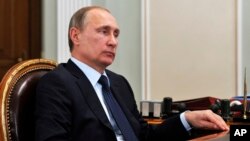U.S.-Russian collaboration to secure a deal on Iran's nuclear program has raised hopes of closer cooperation on other world issues, but analysts say any progress is likely to be slow in coming.
A Kremlin statement issued shortly after the July 14 nuclear deal said Presidents Obama and Vladimir Putin had agreed in a telephone conversation to work together on "certain other current international matters, including countering international terrorism."
The White House, for its part, said the leaders "had expressed a desire to work together on reducing regional tensions, particularly in Syria."
But any new spirit of cooperation between the two powers is likely to be limited in scope, says Andrey Baklitsky, director of the Russia and Nuclear Non-Proliferation at the PIR Center in Moscow.
“The issues where the Russian and Western approaches are different would not be affected that much,” he says. “On the issue of Ukraine, it’s clear that Russia and the West have quite different approaches.” He adds, “Especially if you’re talking about Crimea, I don’t think that’s really reconcilable at the moment.”
Relations between Russia and the West have been severely strained since Moscow was sanctioned last year for annexing Ukraine’s Crimean peninsula and supporting separatists in the east.
Western governments accuse the Kremlin of supplying the rebels with weapons and troops, a charge it has always denied despite mounting evidence.
Russia did help mediate a 2013 deal to dispose of the Syrian government’s chemical weapons; but the Kremlin continues to back President Bashar al-Assad even as he stands accused of using barrel bombs on civilian populations.
The rise of the so-called Islamic State terrorist group has renewed the urgency of cooperation in the region, says Nikolay Kozhanov, a non-resident scholar with the Carnegie Moscow Center. “Definitely there is a clear sign that, despite of all contradictions the Russians, hopefully the Americans, they would like to find a common language on what’s happening here and how to settle this issue.”
He goes on to say, “It’s quite obvious that the current crisis that’s taking place in Syria and Iraq is impossible to contain within the borders of these countries and it’s definitely overspilling.”
But analysts say it could take years to bridge the gap on Syria, where Western governments want a change of leadership and Russia remains one of Damascus’ staunch allies.
Meanwhile, Russia may be planning to spend the political capital it earned by helping to negotiate the Iran nuclear deal.
In a Foreign Ministry statement, Lavrov quoted Obama as having said in 2009 that a resolution of the Iranian nuclear issue would remove the need for U.S. missile defenses in Europe.
“We hope that our American colleagues remember this and will adjust their plans accordingly,” Lavrov said. “We are prepared for dialogue on this issue.”
Washington says Iran’s ballistic missile program spurred the need for the system to protect allies in Europe, but Russia fears it is the target of containment. In any case, inspections of Iran’s ballistic missiles was not included in the nuclear deal and the defensive program is not yet in place.
Some political analysts argue the system, not yet developed, is not worth the tension. Others counter that with no iron-clad guarantees on Iranian missiles, and a nuclear inspection regime not yet in place, the United States has good reason to continue the controversial program.
The analysts say Russia had its own internal reasons to supprot the Iran nuclear deal, which would lift economic sanctions on the country in exchange for restrictions on its capability to develop nuclear weapons.
“The Iranian energy markets, the nuclear field, and definitely the Iranian arms market represent quite a huge interest for Moscow,” says Kozhanov. “From this point of view, definitely the Russians would like to get an access to these markets; but, without lifting sanctions it would be hardly possible.”
A possible negative for Moscow is that the lifting of sanctions will allow Iran to boost its energy exports, potentially driving down the price of oil - a key Russian export. But Yevgeny Satanovsky, president of the Institute for Middle East Studies in Moscow, says that would not happen any time soon.
“Iranian oil will be not on the world market tomorrow,” he says. “And, even if it will be tomorrow, it will be much more profitable for Iranians to sell this oil to the Japanese market, Indian, Korean, Chinese, so on and so on.”
Iran also has the world’s largest gas reserves but Satanovsky says it will require several years and billions of dollars in investment before Tehran can tap the potential.
More immediately, the nuclear deal puts Russia first in line to continue building Iran’s nuclear energy plants. Russia also wants the United Nations to lift an arms embargo against Iran so its weapons manufacturers can resume that long-time lucrative trade with Tehran.




